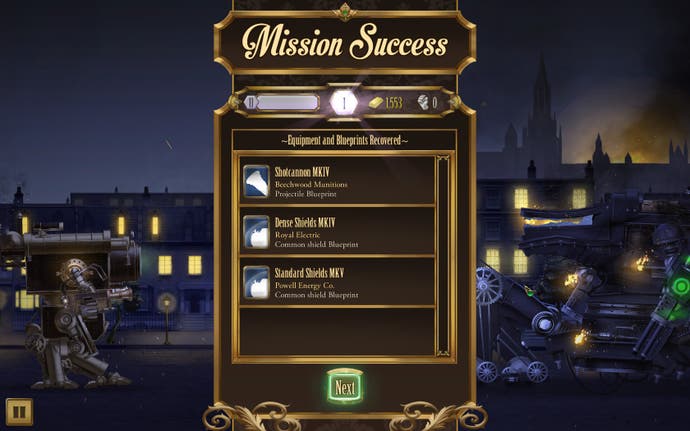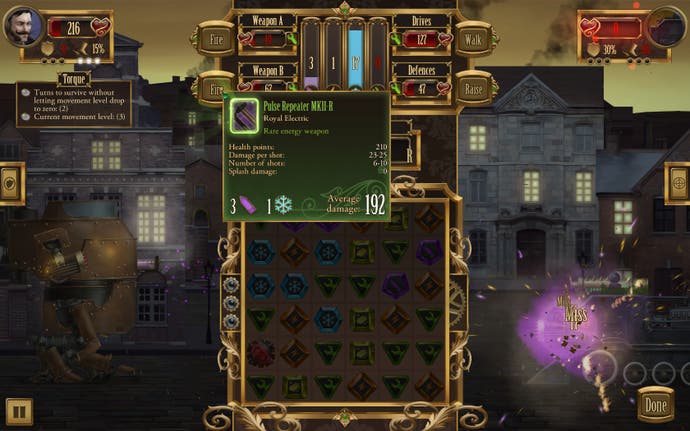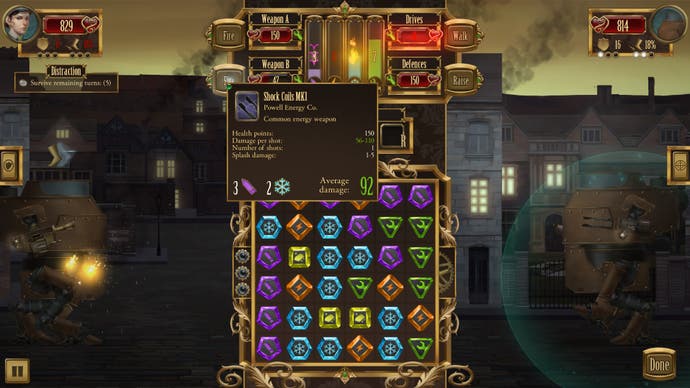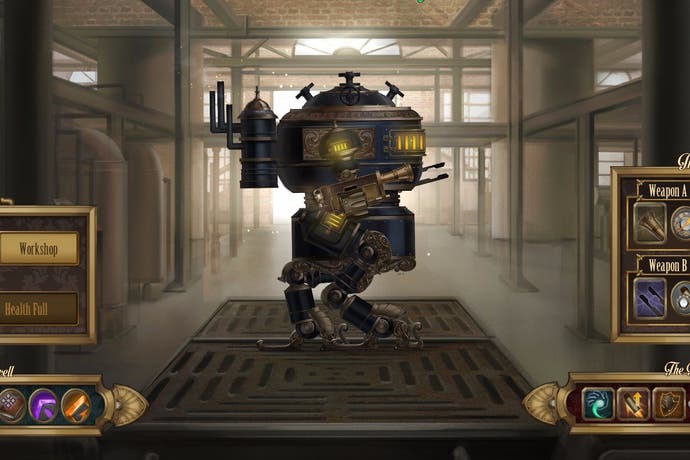Ironcast review
Smelts like victory.
If you'd pegged Ironcast as one of those puzzle games that dresses itself up as strategy, you've got it the wrong way round. This is a strategy game - and a surprisingly fiendish one - that has donned the friendly clothing of a simple match-three timewaster. More than that, it's also a roguelike - or a roguelite, anyway, if you're happy to allow that word to exist. Whatever, it's the genuine article, with all the suffering that comes from a stat-wiping defeat, and all the anguish that builds as you ponder your next fateful decision.
And this is good news. Roguelikes and their ilk can make you feel pretty weak and feeble, but when the tumblers spin in your favour, they can turn you into a god. Take a humdrum sortie to Canterbury the other day. A loot drop went my way and instead of the normal common clobber, I was left with a rare missile launcher that does, on average, 198 points of damage per turn. I clamped it on back at the hangar, and did what came naturally: I headed to Croydon. Another humdrum sortie, of course, but this time enemies were coming apart in two blasts from that missile launcher, each pull on the trigger lofting a fat missile into the air. The thud! Oh, you never heard such a thud. And I never had such luck on a loot drop. I felt almost guilty, except I knew how long it would be before another drop went so thoroughly in my favour. Five hours of playing, and this had been my only rare.
Except right there in Croydon, I got another one. A rare energy beam, doing, on average, a sizzling 192! With weapons that tackled both the hulls of my enemies and the shields, I suddenly had all of my bases covered. Roguelikes, eh? (I died in Haslemere shortly afterwards.)
Ironcast's set in an alternate history where France and England are waging a bitter war over some MacGuffin I neglected to note down the name of. Since it's the end of the 19th century, they're battling it out via huge clomping mechs, driven by hissing boilers and juddering valves. If it wasn't for the laser cannons clapped on the front, you'd expect these death machines to make a decent cup of tea; as is, they're relentlessly charming in that busy, awkward way that mechs always are. The game's opted for a 2D, hand-painted aesthetic, and, although you're fighting to protect the South of England, there's something of the wild west as your mech advances to the right, guns blasting, and their mech advances to the left.

The fights themselves play out in the centre of the screen on a grid which, in a playful nod to the period, is backed with flock anaglypta. I can't think of many other games that come with a feature wall. Like Puzzle Quest, you're using a match-three system to damage your foes and grab loot. Unlike Puzzle Quest, it's all a little more involved. You can create long chains of gems by linking them rather than simply swapping their positions (you can even link diagonally), your enemy's rolls take place off-screen so you're not left fuming about the mysteries of iniquity quite as much, and the actual use of the gems themselves has been expanded far beyond firing off weapons and scoring gold.
This is where the more tactical stuff comes in. Rather than dealing damage directly, gems - or nodes, as the game has them - simply power up various gauges in your Ironcast, different colours giving you ammo, energy (for use on shields and drives), repair capabilities for when a system is damaged by incoming fire, and scrap (this works as money in the wider campaign). Once you're stocked up, you can then fire weapons, engage defences, fix systems that have been shot to pieces, or even set your mech in motion, raising the chances of missing an incoming shot. Compounding matters is coolant, another gem-matching resource that burns up every time you take an action. Run out of coolant and your own shots or shield buffs start to damage your own hull. You can shield yourself to death in Ironcast. I did, and it was embarrassing.
Battles are turn-based, and much of the immediate complexity comes from the fact that, while you can make three matches on the gem board before handing over to your foe, you can carry out as many actual actions as your gems have given you sufficient power for. In a typical turn, you might be able to raise and buff shields, fix a few bits and pieces, and fire off a couple of rounds, too.

When it comes to the actual gem stuff, Ironcast is a little underwhelming: besides link gems that allow you to chain two colours, and overdrive gems that give your next action a little oomph, it's all fairly simple, and the main question comes down to whether you want to go for the longest match to get the XP, or match only what you will use, thus leaving the board in a good position for next time. The actual battles themselves are far more complex affairs, though, particularly when you take into account which enemy systems you want to aim your volleys at. Take down your foe's shields with an energy weapon so that your cannon can really do the damage, or silence his guns so he'll waste tempo on repairs?
A handful of mission types mix things up further: beyond straight-up battles, there are survival missions, where you simply have to hold out for ten turns, collection missions, where you gather crates that appear in the grid alongside gems, and even salvage missions, where you have to take down a foe without damaging a specific part of their mech. Whatever you're up against, your greatest resource isn't actually on the grid itself anyway: it's your hull strength, which is essentially your health. When this is whittled down to zero, you explode in a wonderfully percussive fashion, flames rising from the curlicued remains of your mech, smoke drifting forlornly into the sky.
All of which is lovely. For my money, though, the real Ironcast comes alive through the campaign's wider framework where tactics are replaced with strategy. This is one of those games where you can win the battle and lose the war, and it all comes down to a juggling of two additional stats: scrap and war assets, the former allowing you to buy upgrades and repair hull damage between fights, and the latter eating away at the health of the next boss you're going to face before it arrives.

Both of these resources are awarded for taking on missions, but the health of your own mech muddles with a best-case approach maddeningly well. You can earn a bunch of scrap on a huge fight, but then find you have to waste most of it patching yourself up afterwards, leaving you little to spend on enhancements. Equally, you can play it safe, fighting only the battles you know you can win, and then approach the final boss with middling war assets, since you skipped the missions that rewarded them the most generously.
It's a beautiful system that puts me in mind of the wonderful difficulties you can get into with a game like Sang-Froid: the small blanket problem once again, where you never have enough resources to do absolutely everything you want to. It's joined by regular levelling up, which grants you a randomised selection of passive buffs or new augmentations for your mech's individual parts or hot bar, and by the loot that mechs drop: either complete systems that you can clamp on for free, covering everything from better cannons to better drives for movement, or in the form of blueprints that you need to spend scrap to research and build.
It's this last part that is potentially going to infuriate people. The RNG is surprisingly strong with Ironcast - it at least feels that way for the first few hours of play. Progress can seem predicated as much on elements that you have no control over - which augmentations you're offered as you level, which loot an enemy drops as they expire - as your skill in dealing and avoiding damage. It doesn't help that the game has a rather strange structure, favouring a couple of overpowered roadblock bosses rather than a steadier supply that ramps up more gently. The approach of these big ticket fiends as they march towards London for a confrontation gives the game a tremendous sense of urgency, but they can also bring the shutters down pretty swiftly if you haven't got the gear you want. Since this is permadeath territory where one failure will send you back to the start, stripped of all loot and augmentations, sudden defeat can wear away at you a little.
Like most roguelikes, though, the true game is about fighting back against the randomness, and you do this with each lesson you learn about the sorts of augmentations to prioritise, and each trick you uncover for minimising battle scars and maximising scrap. If you've got the stomach for the learning curve, you can probably cut it in this army. And if you can, you'll discover a game that's tense and personable and clever.


